
by Clair Mooney | Feb 25, 2022 | Labour
Temporary changes to right to work checks introduced in response to the coronavirus pandemic have been extended again and will now end on 30 September 2022. Employers can continue to undertake checks via video calls and use scanned copies rather than original documents until this date.

by Clair Mooney | Feb 25, 2022 | Main News Feed
Mitchell will step down as co-chair of the Construction Leadership Council in Spring 2022.
Andy Mitchell, who co-chairs the CLC alongside the Minister for Business and Industry Lee Rowley MP, was appointed in October 2018 and has since guided the sector through the considerable challenges of Covid-19 while establishing the CLC as a powerful and recognised driver of change for the sector.
With this increased presence, the CLC continues to deliver positive change with priorities in 2022 including Construct Zero, Building Safety, meeting the Skills Challenge, and implementing the Construction Playbook.
The CLC is now seeking nominations for Andy Mitchell’s successor, which will include working directly with Government, chairing a range of its industry-wide meetings, alongside acting as a spokesperson for the CLC.
Announcing his decision to step down Mr Mitchell said:
“I am extremely proud of what we have achieved together in the last 3 years, and it is clear that not only did we play a major role in leading the industry through the pandemic but in the process we have managed to get a unity and coherence in the industry not seen before – and we are now with credibility and confidence laying out plans for the industry’s development in the future. With a little over 18 months to go before we start commissioning on Tideway, it is right that I now dedicate my full focus to the project, but I wish the CLC the very best for the future.”
FIS Chief Executive Iain McIlwee said:
“I would like to extend, on behalf of all the FIS Community, our gratitude to Andy for the sterling work he has done and the time he has given, notably during the pandemic when we started to see the CLC in a whole new light. Andy embodied good leadership, approachable, committed, open and dynamic and his contribution to helping our sector through one of its most challenging periods is a testament to this and will not be forgotten.”
CLC Co-chair Lee Rowley MPadded:
“On behalf of the CLC and the Government I want to express our thanks to Andy for the extraordinary commitment that he has provided to the CLC for the past three years. His leadership of the Council through one of the toughest challenges that the industry has faced has been exemplary and has set UK construction on a positive course for the future”
About the Construction Leadership Council (CLC)
The CLC’s mission is to provide sector leadership to the construction industry. The expanded CLC has twelve workstreams that operate collaboratively to address the biggest issues facing the sector. Workstreams include skills and inclusion, building safety, Net Zero and business models. The CLC is co-chaired by Lee Rowley MP, Minister for Business and Industry, and Andy Mitchell CBE, CEO of Thames Tideway.
The CLC was created in 2013 to work between industry and government to identify and deliver actions supporting UK construction in building greater efficiency, skills and growth. The CLC is Co-chaired by the Minister for Business and Industry (Lee Rowley MP) and an Industry representative (this role), who provides the overall leadership and co-ordination of the CLC. The Co-chair is appointed by the Industry and BEIS.
The primary function of the Co-Chair is to provide leadership and strategic direction to the Council, facilitate the operations and deliberations of the Council and lead the Council’s functions and responsibilities under its mandate. The role will require the candidate to have an excellent understanding of the industry and its challenges and be able to represent the industry as a whole from large to SME, design to aftercare, including specific issues such as Building Safety. They must be a champion for industry change and promote inclusion, diversity and improving the image of industry, as well as understand future trends and requirements to address industry change, i.e. sustainability, innovation, productivity and skills.
The job description is available here with details of the selection timetable. The selection process will be led by members of the CLC’s Steering Co-Ordination Group. Expressions of Interest should be emailed to construction.enquiries@beis.gov.uk.
Deadline for applications: Thursday 31 March
Interviews: Mid/late April
Appointment: By end of April
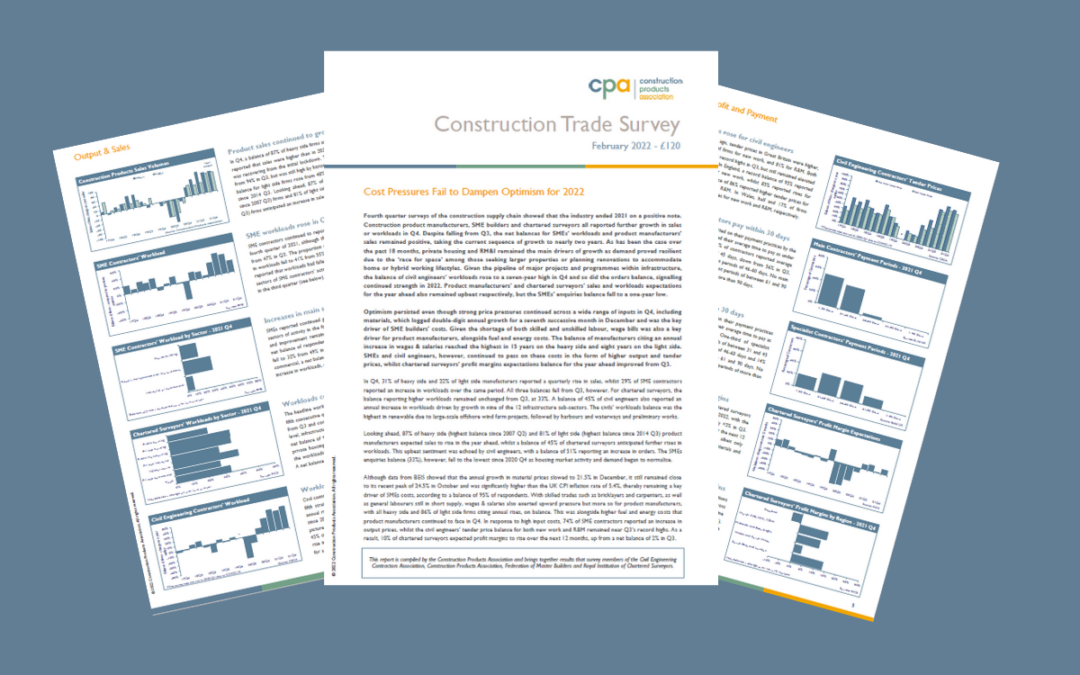
by Clair Mooney | Feb 25, 2022 | Market data
Fourth-quarter surveys of the construction supply chain showed that the industry ended 2021 on a positive note. Construction product manufacturers, SME builders and chartered surveyors all reported further growth in sales or workloads in Q4. Despite falling from Q3, the net balances for SMEs’ workloads and product manufacturers’ sales remained positive, taking the current sequence of growth to nearly two years.
As has been the case over the past 18 months, private housing and RM&I remained the main drivers of growth as demand proved resilient due to the ‘race for space’ among those seeking larger properties or planning renovations to accommodate home or hybrid working lifestyles. Given the pipeline of major projects and programmes within infrastructure, the balance of civil engineers’ workloads rose to a seven-year high in Q4 and so did the orders balance, signalling continued strength in 2022. Product manufacturers’ and chartered surveyors’ sales and workloads expectations for the year ahead also remained upbeat respectively, but the SMEs’ enquiries balance fell to a one-year low.
The CPA’s Construction Trade Survey brings together results from surveys of building contractors, specialist contractors, civil contractors and product manufacturers. It provides a pan-industry assessment of current and expected conditions.

by Clair Mooney | Feb 24, 2022 | Sustainability
Are you a leader working in the Construction, Manufacturing or Transport sectors seeking to drive and influence meaningful change in relation to Net Zero ambitions?
Fully funded, CPD certified training is now available to ensure that you are upskilled with climate emergency principles to enable informed workforce planning and skills development to support Scotland’s Net Zero ambitions. For more information and sign-up page: https://transitioningatpace.com/
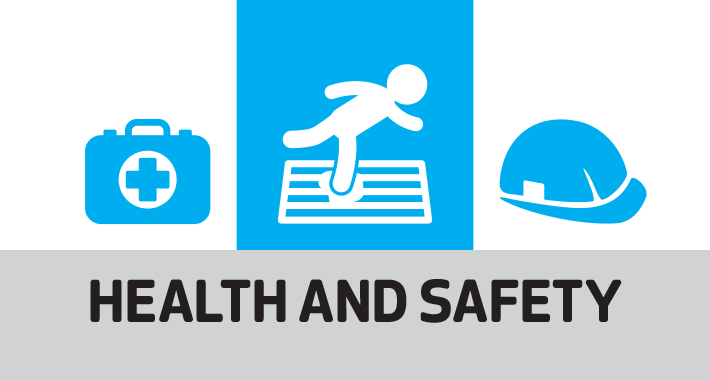
by Clair Mooney | Feb 22, 2022 | Health and Safety
Hazards and risks are present in any workplace. The truth is, accidents happen and are sometimes unavoidable. But, as an employer, you do have certain legal obligations when it comes to recording and reporting near misses, accidents, and incidents in your workplace.
To help you get to grip with your responsibilities, FIS Associate Member Citation, has put together a handy checklist of everything you need to know about accident reporting. The free checklist outlines how to report an accident for your employees, how to log accidents and indicates in your accident book, your RIDDOR reporting obligations, and how and when you need to report to the Health & Safety Executive.
DOWNLOAD: https://tinyurl.com/fisaccidentreporting
FIS member benefit
If you’d like to chat about how Citation can help with the HR and Health & Safety side of your business, just give them a call on 0345 844 1111, or fill in their call-back form and they’ll get right back to you.
Please quote ‘The Finishes and Interiors Sector’ when enquiring to access your member benefit and preferential rates.

by Clair Mooney | Feb 22, 2022 | Main News Feed
FIS is pleased to announce that Philip Brown has been elected as Vice President of its executive board.
A member of the FIS board of directors for six years, Philip has more than 45 years’ experience in the construction industry. He started out as an electrical apprentice before going on to project manage numerous interior works, gaining in depth knowledge and experience within the industry before joining Meronden Ltd in 1997 as director.
“I am looking to build upon the good work that the board has achieved by actively encouraging the increase of new members whilst maintaining the high standards achieved within the membership,” said Philip. “I am also keen to increase the profile of the association within the industry, ensuring it is associated with quality, commitment and prestige.”
Philip continued: “I believe that as a specialist industry, by working in association with one another we are able to share information, ideas, trends and best practice which will enable each member to succeed in today’s challenging and ever-changing market.”
Commenting on the new appointment, FIS CEO Iain McIlwee said:
“Philip has already made a huge contribution whilst on the board and has been instrumental in the development of a number of key projects. Add this to his exceptional track record across the finishes and interiors sector, and we have the ideal Vice President. Philip will play a crucial role in taking FIS onto its next chapter of growth and success.”
For further information or for any questions please contact the FIS at info@thefis.org or call 0121 707 0077.
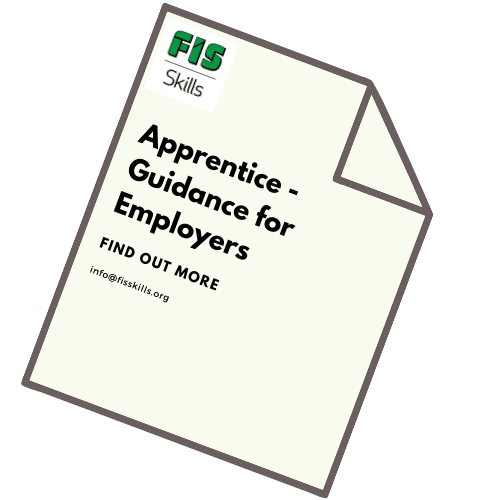
by Clair Mooney | Feb 17, 2022 | Skills
Apprentices are a vital investment in the future. A well managed programme can help enhance productivity, improve business performance and develop a committed and competent workforce.
To help support businesses in taking on an apprentice, FIS has created a useful guide detailing the support and funding available to help you to make your apprenticeship programme a success. It provides employers with the information needed to recruit, register and secure funding for apprentices. The guide includes information on the apprenticeship funding pledge and receive system and details on the CITB Grant ‘Travel to Train’.
The guide also includes access to the CITB Apprenticeship Recruitment Toolkit, which provides further guidance for recruiting and supporting apprenticeships. The toolkit details the various routes to hiring an apprentice across England, Scotland, and Wales. There is also, a choice of four other sections to explore, including support available from CITB. This includes assisting employers with completing paperwork, or financial support, with a breakdown on how to claim funding and CITB grants for apprentices.
If you would like to talk through the options for employing apprentices give us a call, 0121 707 0077 or email info@thefis.org we will be happy to help.
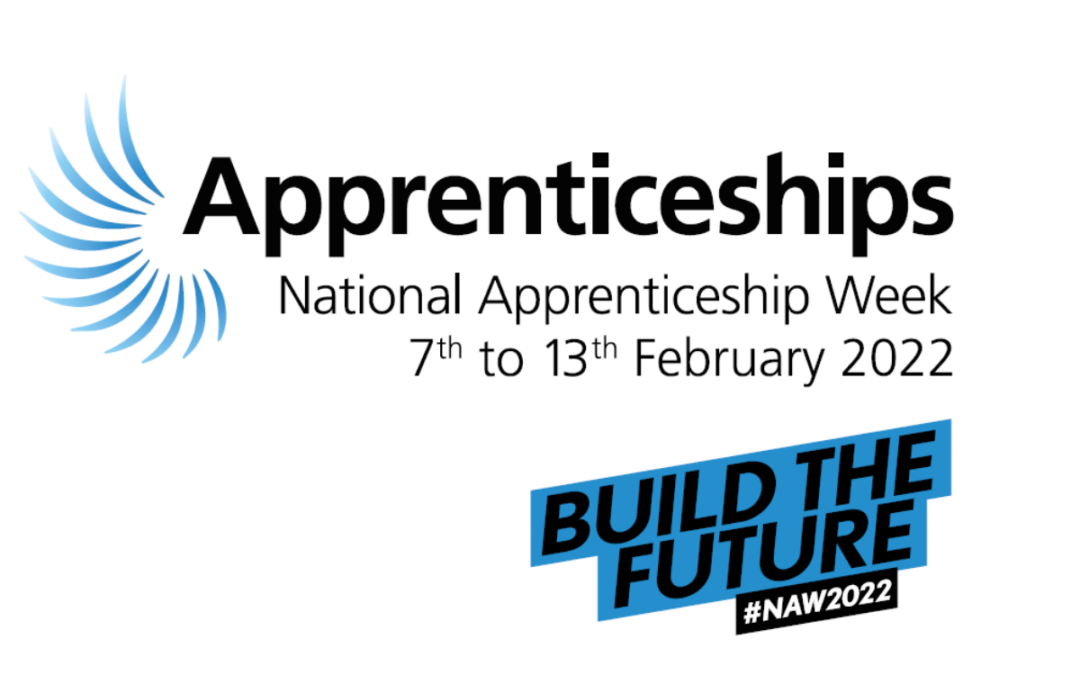
by Clair Mooney | Feb 11, 2022 | Skills
National Apprenticeship Week 2022 is well underway and this year’s theme ‘Build the Future’ provides an opportunity for organisations to inform young people in England and Wales how they can pursue a rewarding career in construction and showcase the contribution they are making to the future finishes and interiors workforce.
It also ensures as a sector, we come together and celebrate apprenticeship journeys and successes as well as to say ‘Thank You’ to everyone who makes them possible.
We are thrilled to have seen so many members get involved showcasing their apprentices. If you haven’t already done so, it’s not too late to get involved!
• Celebrate your apprentices ‐ Put your apprentices front and centre of your business and on social media using the hashtag #NAW2022
• Use your Apprenticeship Levy ‐ make sure you are using your Apprenticeship Levy or pledging it to other employers in your supply chain via the Apprenticeship Levy Transfer to help them deliver their apprenticeships.
• Promote your apprenticeship vacancies ‐ Ensure all your apprenticeship opportunities are registered on the FIS JobSpot and let us know about work placement opportunities.
Support and advice
The FIS website has a range of tips and advice on how you can look at taking on apprentices, including our FIS Apprentice – Guidance for Employers.
We can also support you in taking on an apprentice and accessing the appropriate funding. Contact the FIS team on 0121 707 0077 or email info@thefis.org to start the conversation.
For updates during the week follow FIS on Twitter or FIS on Linkedin and if you are sharing an apprenticeship story, please tag us in so we can help amplify on behalf of our community.

by Clair Mooney | Feb 11, 2022 | Main News Feed

by Clair Mooney | Feb 10, 2022 | Skills
Employers in England that pay the apprenticeship levy can transfer their unused apprenticeship funds to help other organisations pay for apprenticeship training. The employer that receives the funds can only use them to pay for apprenticeship training and assessment. You can transfer up to
25% of your apprenticeship funds.
Prior to sign up you will need an apprenticeship service account
Create an account to manage apprenticeships – Manage apprentices (manage-apprenticeships.service.gov.uk)
Transferring Your Apprenticeship Levy to Another Business
Transferring your apprenticeship levy to another business – GOV.UK (www.gov.uk)
An apprenticeship levy paying employer can transfer up to 25% of their annual levy funds to another employer to pay for the training and assessment costs for apprenticeship standards. Transfers can support new apprenticeship starts, this includes existing staff starting an apprenticeship or where the apprentice’s employer has changed. Transfers may be used to support the skills gaps and shortages within locations or sectors.
Receive a Levy Transfer from another Business to Fund an Apprenticeship
Receive a levy transfer from another business to fund an apprenticeship – GOV.UK (www.gov.uk)
Transfers is one way of receiving funding to support the costs of apprenticeship training and assessment. By receiving a transfer, if you do not pay the levy then you will save the 5% employer co-investment. Also, transfers do not count towards reservation of funds. Apprenticeships are not just for new employees; they are available to upskill existing employees too.

by Clair Mooney | Feb 10, 2022 | Skills
Way to Work is a new partnership between government and employers to get 500,000 jobseekers into work by the end of June 2022.
This partnership will help fill the large number of vacancies and help job-ready people into the labour market. If you are looking to fill a vacancy, Jobcentre Plus can offer you a named employer adviser in your local jobcentre, or a dedicated national account manager if you are a national employer.
For more information- Way to Work – JobHelp (campaign.gov.uk)
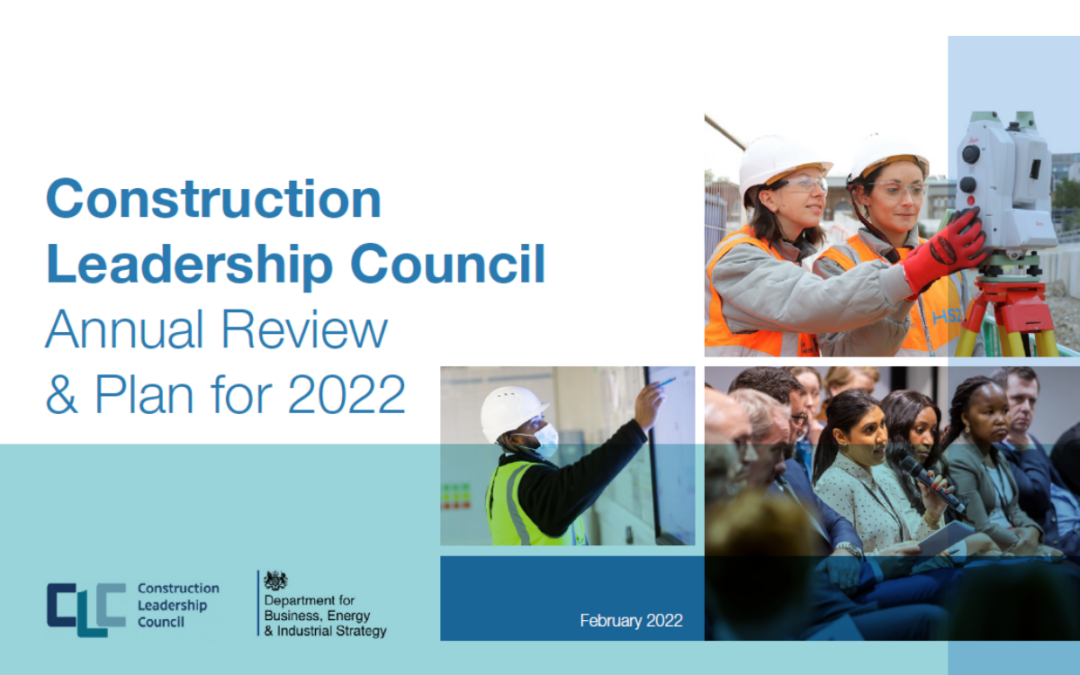
by Clair Mooney | Feb 7, 2022 | Main News Feed
The Construction Leadership Council has set out four priorities to deliver a better UK construction sector in 2022.
The Council has picked issues where there is the greatest need for collaborative industry action, and the greatest opportunity to deliver positive change. The four priorities for 2022 are:
- Net Zero Carbon
- Building Safety
- Meeting the Skills Challenge
- Implementing the Construction Playbook
The announcement of the four priority areas comes as the CLC published its Annual Review for 2021.
Having established itself as the leading force for the industry in 2020 with its response to Covid-19, in 2021 the CLC built on this success. It led UK construction’s work ahead of the COP26 climate change summit with CO2nstructZero, while also responding promptly to the emerging threat of materials shortages to improve product availability nationwide. It launched a single hub for all new entrant jobs – TalentView Construction – while setting out the first ever Skills Plan for the whole UK construction industry.
Among its objectives this year it is targeting apprenticeships, aiming to return numbers to pre-Covid levels to meet future skills needs. It will publish quarterly data to show the sector’s journey to zero carbon. On Building Safety, it will work with partners to roll out frameworks to ensure that those working on buildings have the competence to build and maintain them safely. And it will continue its work to promote the Government’s Construction Playbook, boosting awareness and implementation among clients and suppliers.
CLC co-chair Andy Mitchell CBE said:
“Having lit the spark in 2020, and watched it grow last year, the CLC can deliver transformational change for UK construction in 2022. We know that some of the threats facing our sector are daunting, but we are now working together as a sector, talking on challenges with a united approach. I hope that when we come to write our Annual Review for 2022 the whole sector will be able to judge us by our successes in delivering real change”
CLC co-chair and Construction Minister Lee Rowley MP said: During 2021, the industry demonstrated its ability to adapt to manage the ongoing challenge of COVID-19, and also its willingness to improve, and to start to tackle the need to transform the sector so it can consistently deliver better-performing, safer and more sustainable buildings and infrastructure.
However, we can’t rest on our laurels. We will continue to face challenges during 2022. Only by working together collectively, will we continue to meet these challenges, and truly build back better, faster and greener for future generations.

by Clair Mooney | Feb 2, 2022 | Main News Feed
Half of Build UK Contractor members now pay in an average of 30 days or less, according to the latest results published under the Duty to Report on Payment Practices and Performance.
Despite the ongoing challenges presented by the COVID‐19 pandemic, payment performance has improved again over the last six months, underlining how the increased transparency provided by the Build UK table is transforming the industry culture around payment. Contractor members are now reporting an average of 32 days to pay invoices, down from 34 days last July and 45 days when Build UK first published the information in July 2018. On average, they now pay 95% of invoices within 60 days, up from 82% three years ago, and 82% of their invoices are paid within terms, compared to just 61% in 2018.
FIS Chief Executive Iain McIlwee said “There are some good signs here, but let’s not get complacent – we know from our work with the Small Business Commissioner that most complaints against the Prompt Payment Codes still relate to construction and that the payment issue is more nuanced than when the invoice is raised and paid.
Basically these numbers, whilst positive, don’t present the full picture. We have been working with colleagues in the CLC to highlight this and look at the potential to include value as well as volume of invoice to provide a clearer picture and limit the potential for companies to distort their figures by paying a high volume of small invoices via credit card and also to look at how compliance and the data provided is monitored.”
Build UK’s table features more than 100 of the industry’s largest companies, including contractors, clients and housebuilders, to provide a picture of payment practices across the construction industry.

by Clair Mooney | Feb 1, 2022 | Main News Feed
The Cabinet Office has published the
independent review of public sector frameworks undertaken by Professor David Mosey, which sets out 24 recommendations for a new ‘Gold Standard’ designed to
‘improve the outcomes delivered by framework strategies procurement, contracting and management and to avoid the pitfalls of bureaucratic and inconsistent practices’. By helping clients and suppliers to create and implement Gold Standard action plans under current frameworks, it is hoped that Government and industry can achieve the objectives of the
Construction Playbook to deliver projects ‘faster, better and greener’.
Recommendation 20 promotes the use of the Common Assessment Standard to ‘reduce procurement costs by consistent and proportionate assessment of [suppliers’] economic and financial standing’. The Common Assessment Standard is being rolled out across the industry with a growing list of organisations using it for their PQ requirements, and members of the supply chain can obtain certification from any one of three Recognised Assessment Bodies ‐ Achilles, CHAS or Constructionline.

by Clair Mooney | Feb 1, 2022 | Health and Safety
As part HSE’s ongoing Working Minds campaign, spot checks will be conducted to inspect how employers are recognising work-related stress – to help support and sustain good mental health in the workplace.
To help you support employees with stress and stay on the right side of the law, the Health & Safety experts of FIS Associate Member Citation, have put together an exclusive guide on stress risk assessments – including how to recognise the signs of stress and assess the risks involved.
DOWNLOAD HERE: https://tinyurl.com/fis22stress
FIS member benefit
If you’d like to chat about how Citation can help with the HR and Health & Safety side of your business, just give them a call on 0345 844 1111, or fill in their call-back form and they’ll get right back to you.
Please quote ‘The Finishes and Interiors Sector’ when enquiring to access your member benefit and preferential rates.

by Clair Mooney | Jan 28, 2022 | Main News Feed, Skills
T-Levels are a new approach to sector engagement, designed to develop and secure advanced technical skills aligned to industry standards, and to address the increasing skills shortages and labour costs in industries such as construction, as well as the many benefits (for all parties) of placing committed and motivated students into workplaces, through industrial placements. Often technical students can make a genuine and lasting contribution and present a valuable new recruitment channel to any business.
FIS has been offered the opportunity to host an employer support package presentation, providing information on the benefits of T-Level’s and the support available for employers. There will also be opportunity to ask any questions you have. If you are interested in attending, please email georgeswann@thefis.org by Friday 11 February 2022.
About T-Levels
T-Levels are new courses which follow GCSEs and are deemed to be equivalent to three A levels. These two year courses, which launched September 2020, are for 16 to 19 year olds and have been developed in collaboration with employers and businesses so that the content meets the needs of industry and prepares students for work, further training or study.
T-Levels offer students a mixture of 80% classroom learning and 20% ‘on-the-job’ experience during an industry placement of at least 45 days. The placement can take place as a block, day release or a mix of these, and employers receive an incentive payment of £1000 per student. The scheme is designed for employer to:
- Grow the talent pipeline
- Attract a new generation of recruits from new sources
- Tackle skill shortages
- A chance to see potential future recruits using their skills and abilities
- Streamline recruitment processes
For details of the support available for employers please see T Levels and industry placement support for employers
There are currently two Construction T-Levels:
Design, surveying and planning for construction (available now) the course offers a core knowledge of how the construction industry works, the principles of design and the role of technology and sustainability. Students then have the chance to specialise in either Building services design, Civil engineering, Hazardous materials analysis or surveying.
Onsite construction (started September 2021) learners have the option to cover at least one trade from a choice of bricklaying, carpentry and joinery, painting and decorating or plastering. FIS are seeking support to develop an occupational specialism in interior systems installation.
There are a number of progression options open to students. These include skilled employment, an apprenticeship and higher education. UCAS points are attached to the overall T-Level achievement grade. If you would like to offer an Industrial Placement for T-Level students, you can register at Employers Next Steps or call 08000 150 600 (choose option 4).
There is a CSCS Card for Industry Placement: https://www.cscs.uk.com/card-type/industry-placement-card/ specially for T-Level and Traineeship students.

by Clair Mooney | Jan 27, 2022 | Drylining, Skills
Leeds College of Building Interior Systems Installer Apprenticeship Programme 2022
Enrolment is now open for the Dry Lining option of the Interior Systems Installer Apprenticeship, for full details please see: Interior Systems Installer | Drylining Apprenticeship Training Course | Level 2 NVQ (lcb.ac.uk). Under the current Apprenticeship funding system, the employment of a 16-18 year old apprentice is fully funded by the government where an employer has less than 50 employees. If 50+ employees, the employer will only pay 5% of the course cost resulting in a nominal fee of £700 split across two years.
CITB registered organisations will be eligible to claim the apprentice attendance grant of £2500 per year and apprentice achievement grant at £3500. The government also offer a £1000 incentive payment to all employers who recruit a 16-18 year old apprentice.
In summary the apprenticeship training is a 24 month programme delivered on block release in 11 x 1 week blocks. This provides an opportunity for organisations anywhere in England to send their apprentices. Block release tends to make the individual capable for more tasks when they return to site. The college will assist in securing accommodation for students and for organisations that are CITB registered, grants are available for apprentice travel and subsistence covering up to 80% of the costs, please see: Apprenticeship travel and accommodation funding ‘Travel to Train’ – CITB
If you are considering taking on an apprentice and would like to find out more about the Level 2 Interior Systems Installer Apprenticeship please get in touch with the Apprenticeship Team at Leeds College of Building. They will be able to advise you on the course content, offer advice for apprenticeship levy and non-levy payers and provide details on the end point assessment (EPA). They can assist employers with the process by providing informative emails, videos and telephone assistance, Call: 0113 222 6041 or Email: wbl@lcb.ac.uk
From 1 April 2021 all employers are required to use the government apprenticeship service to secure funding for any apprentices they wish to employ. Apprentices will be unable to start their course at college without reserving funding.
FIS will be happy to provide information advice and guidance on recruiting apprentices take a look at the FIS Apprentice – Guidance for Employers, downloadable from the FIS web site at: https://www.thefis.org/skills-hub/apprenticeships-and-qualifications/apprenticeships-employers/. Alternatively call George Swann on 07553 874838 or email georgeswann@thefis.org

by Clair Mooney | Jan 27, 2022 | Main News Feed
All COVID‐19 ‘Plan B’ restrictions in England have now been lifted. This means that face coverings are no longer mandatory in any setting, although people are still advised to wear them in crowded and enclosed spaces where they come into contact with others they do not normally meet. They also remain a condition of travel on Transport for London (TfL) services. Build UK has made two minor revisions to the CLC Site Operating Procedures ‐ Version 9.1 to provide the most up to date guidance for sites and will review the Use of Face Coverings in Construction once the relevant Government guidance has been updated.
The legal requirement to self‐isolate after testing positive for COVID‐19 remains in place, and the Build UK COVID‐19 flowchart reflects the latest rules on self‐isolation.
Restrictions are also being eased in Scotland, Wales and Northern Ireland, although face coverings remain mandatory in certain settings in all three nations.

by Clair Mooney | Jan 25, 2022 | Main News Feed
The First Minister has delivered a
statement to Parliament and outlined further easing of measures.
Businesses can prepare to resume hybrid working from 31 January, enabling more people to have a flexible return to working between home and the office. Hybrid working guidance will be published shortly.
Testing requirements for fully vaccinated people arriving in Scotland are to be dropped from 4am on 11 February, following agreement at a cross-UK meeting. Travellers will still need to fill in passenger locator forms. Non vaccinated travellers will still be required to take pre-departure tests and a PCR test on or before day two – but the requirement for isolation will end – and they will no longer have to take a day eight test.
Other changes announced include the requirement for two metre physical distancing for indoor settings where people have a specific exemption from the need to wear a face covering – e.g. people leading religious services or carrying out some receptionist duties – reverting to one metre. In addition, face coverings will no longer be required for any adult taking part in organised activities when they are directly interacting with children under the age of five. Both of these changes are from Friday (28 January).
Guidance on the Close Contact Services Fund – which will provide financial support to businesses impacted by the requirement for physical distancing and capacity limits and advice to reduce contact within indoor settings that came into force from 9 December 2021 to 24 January 2022 – has been published. Information about funding to support the Scottish brewery industry has also been published.
A voluntary Distance Aware Scheme which will see free badges and lanyards will be available to people who wish to show others they would welcome additional space and extra care while out in public will formally launch in Scotland tomorrow (January 26). A stakeholder pack is attached which includes posters and social media assets and suggested posts.
Guidance for businesses and workplaces on reducing the risk of COVID-19 and supporting staff and customers has been updated to enable businesses to take reasonable measures to limit the rapid spread of the Omicron variant.
The NHS Inform coronavirus webpage is the fastest way for people to get the latest health advice and information.
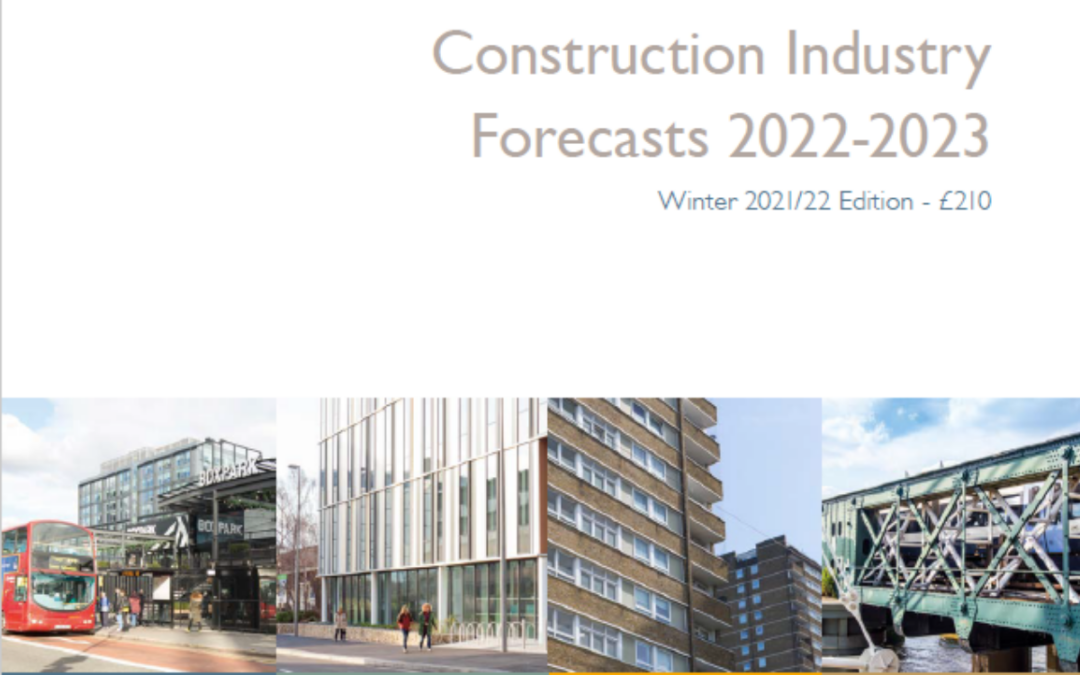
by Clair Mooney | Jan 24, 2022 | Market data
In its latest quarterly forecast, the Construction Products Association (CPA) forecasts that output in the industry will grow by 4.3% in 2022, slowing to 2.5% in 2023 compared to the 13.3% seen in 2021. This demonstrates the remarkable resilience of the sector to the initial Covid-19 lockdown and the end of the Brexit transition period in 2020. Housebuilding, the largest sector within the UK construction industry, is expected to remain strong whilst infrastructure will be the major driver for growth. Projects already underway in all sectors give great confidence for the forecast figures.
Continuing to benefit from the ‘race for space’, output in private housing is forecast to rise by 3.0% in both 2022 and 2023 following 17.0% growth in 2021. CPA suggests that the double-digit inflation in house prices will fall as the impact of the end of the stamp duty holiday and the further restriction of the Help to Buy scheme feeds through. The outlook for volume remains positive, with most major house builders reporting strong near-term demand and healthy profit margins fuelled by demand for housing in affordable areas of the UK. Also benefiting from the ‘race for space’ in the near-term is the private housing rm&i sector. Here the CPA forecasts output to remain flat at the historically high level reached with 17% growth last year. Rising renovation project costs and higher inflation rates are expected to slow down consumer spending on larger projects. UK households have benefited from building up over £200 billion of savings from the past two years but rising costs are spelling caution for spending compared to 2021.
The CPA Winter Forecast indicates the infrastructure sector to remain as the main driver for growth in 2022. This mirrors the CPA Autumn Forecast which pointed to the five-year spending plans within the regulated sectors of rail, water, roads, and energy, allowing the sector to maintain activity levels and weather supply issues. Key projects include the Thames Tideway Tunnel, Hinkley Point C and HS2. At least two of these projects report delays due to supply constraints and this could result in further work being pushed into 2023. Taking this into account, the sector is still expected to rise by 9.7% in 2022 and 1.1% in 2023, taking the sector to a new all-time high.
Product supply issues, a major challenge in 2021, have eased recently, but may still cause problems. The CPA still considers these to be the biggest challenge to overall growth. Questions over sufficient materials, products, labour, HGV drivers and imports will be at the forefront of industry. These challenges are not spread equally across the sector, with smaller specialist sub-contractors feeling the pressure more.
Major house builders and main contractors are less affected as they have better visibility of medium-term demand and can plan and purchase well in advance; plus, they are the larger customers of the manufacturers, builders’ merchants and importers. Smaller firms, however, have found that availability issues have delayed projects and, consequently, revenue streams whilst sharp cost increases have hit margin, harming their viability even though they have strong workloads. Overall, the latest indications are that supply issues have eased recently, which is a positive sign, although it is still early in the year and before industry activity tends to ramp up in the Spring.



















